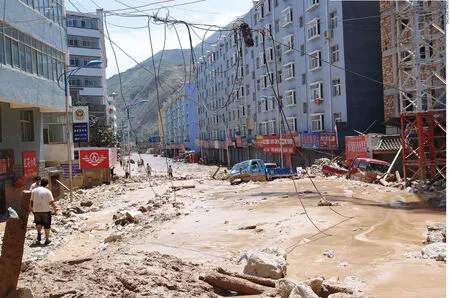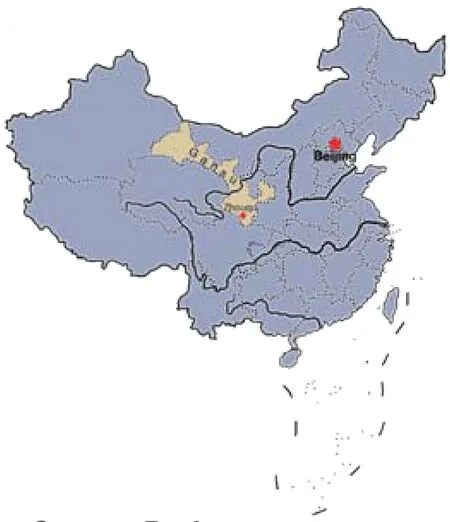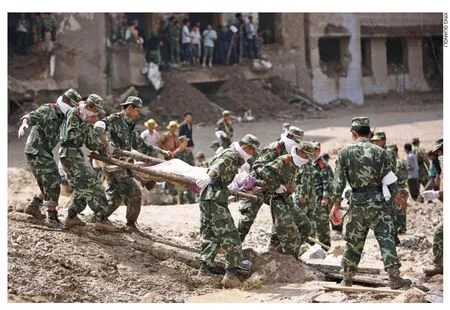MUDDY MIS
2010-03-16LILI
Resources are pooled into a landslide-d Zhouqu County to lift it out of disa

FLOODED TOWN: A street corner in Zhouqu County on August 8 after it was flooded by a clogged river that runs across the county

Basic Data on Gannan Prefecture
Covering an area of 45,000 square km, Gannan Tibetan Autonomous Prefecture, located in the southwestern corner of Gansu Province,administers seven counties and one city. The altitude in Gannan ranges from 1,100 meters to 4,900 meters, but most areas are above 3,000 meters.
Gannan has a population of 680,000, of which the largest ethnic group,378,500 Tibetan people, accounts for 55.6 percent of the population. Occupationally, about 80 percent of the population are farmers or herdsmen. Gannan has pastures totaling 2.72 million hectares, accounting for 70.28 percent of the total land area. In 2009, Gannan’s GDP was 5.08 billion yuan ($747.2 million), up by 13.2 percent from the previous year.
Zhouqu County covers 3,010 square km and has a population of 134,700,about 33 percent of which are Tibetans. It is located in the southeast part of the prefecture.
Source: www.gn.gansu.gov.cn
By LI LI
Residents of Zhouqu County,Gannan Tibetan Autonomous Prefecture in northwest China’s Gansu Province,went to bed on the seemingly uneventful evening of August 7, but woke to fl oodwaters surging through their homes. Forced to climb atop buildings to escape drowning, many watched as their houses collapsed in front of them or were submerged by the rushing water.
Even less fortunate were those killed by devastating landslides while they slept. At around midnight, a downpour of up to 97 mm of rain over a 40-minute period triggered four massive landslides in two valleys in mountain ranges northeast of Zhouqu. The landslides fl attened three villages and buried 300 households. The leveled area, about 300 meters wide and 5 km long, is home to nearly 2,000 people.
The landslides carried about 1.8 million cubic meters of rock and mud that quickly blocked the Bailong River, which runs through the county seat. The river soon fl ooded, overtaking buildings along the riverbank,and eventually engulfed about two thirds of the county seat, where water levels rose to 4 meters in some areas. A total of more than 19,000 people living in two townships along the lower reaches of the river were evacuated during the morning of August 8.
The fl oods and landslides affected nearly 50,000 people in the mountainous county,which sits in the Bailong River valley and is hemmed in by craggy mountains on both sides. By August 12, 1,144 people were confi rmed dead and rescuers were racing against the clock to save 600 others that were still missing.
Sludge and rocks, as deep as 2 meters,spread across some major roads in the county.Many trapped residents waited on rooftops for rescuers, said a press release from the general office of the Gansu Provincial Committee of the Communist Party of China(CPC) on August 8.
“Now sludge has become the biggest hindrance to rescue operations. It’s too thick to walk or drive through,” said Diemu Jiangteng, head of the county, on August 8.
“Since excavators can’t reach the site in time, we can only use spades and our hands to rescue the buried,” He Youxin, an armed police of fi cer, said the same day.
Also on August 8, the Gansu branch of the State Grid Corp. said that two thirds of the county’s power went out immediately after the disaster. Most communication links were also down due to the loss of electricity.
The county’s only faucet water system was destroyed in the landslides and fl oods, and the county badly needed 10,000 tons of water and 500 tons of instant food for the following 25 days, at which point life was expected to return to normal, said a spokesman with the prefecture’s government on August 8.
According to China’s Ministry of Agriculture (MOA), the deadly mudslides affected more than 200 hectares of farmland and swept away over 10,000 heads of livestock.
At a press conference on August 9,Minister of Land and Resources Xu Shaoshi enumerated several causes for the geological disaster∶ the county’s loose, weathered terrain that is prone to landslides and other disasters; the massive earthquake of 2008 in Wenchuan, neighboring Sichuan Province,that shook the mountains around Zhouqu; the sustained drought and soil erosion in the region since last winter; and the torrential rains on the night of August 7.
Xu’s ministry and its local branches have sent more than 150 geological experts to Zhouqu for fi eld studies on locations prone to geological disasters. The information will be used to determine the possibility of future disasters, vulnerable spots will be put into a monitoring system and evacuation plans will be drafted.
Relief in full swing
According to of ficial statistics, 1,243 survivors had been rescued by August 10. The Ministry of Public Security said that by 5 p.m.on August 9, the 1,397 fi re fi ghters on rescue missions in Zhouqu had removed 78 people from collapsed buildings. Traf fi c police forces have also been mobilized to control traf fi c on roads leading to the devastated county to ensure that badly needed supplies and rescue personnel can be transported ef fi ciently.
By 4 p.m. on August 9, a total of nearly 5,000 armed policemen, People’s Liberation Army (PLA) soldiers and airmen had arrived in Zhouqu with professional rescue, engineering and medical equipment to help with the rescue. Most of them were from Gansu,while others were from neighboring Sichuan Province and other regions.
An 80-member rescue team sent by the China Earthquake Administration, equipped with 12 dogs and life-detecting devices, arrived at Zhouqu on the afternoon of August 9. They joined rescue operations immediately after their arrival.
On August 9, the water level in the county seat began to recede after the corps of engineers used explosives on the mud blockade and armed police forces used excavators to clear the sludge from the bottom of the lake.“The danger of a sudden burst of the barrier lake has been basically eliminated,” Jiao Yong, Vice Minister of Water Resources,said at a State Council Information Office press conference on August 11.
In total, more than 13,000 people have been evacuated to higher ground, and three temporary settlement centers, with government-installed tents, were set up on August 9.The first batch of relief materials arrived at the settlement centers early on August 9, and was distributed to people there immediately. The same morning, the first batch of relief materials sent by the Ministry of Civil Affairs, 5,000 sleeping bags, arrived at Zhouqu. Three more batches of tents, sleeping bags and folding beds were on their way from Xi’an, Shaanxi Province, on chartered trains.
China’s Red Cross Society said on August 9 it will give another 1 million yuan($147,000) to Zhouqu to purchase emergency supplies like food and drinking water. It has also allocated relief supplies worth 400,000 yuan ($58,800) for the region. So far, the Red Cross Society and its branches have donated 3.5 million yuan ($514,700) in funds and goods to Zhouqu.
“Relief materials are arriving at the county batch by batch, and have been orderly distributed to residents in need, whose demands for food, drinking water, clothing, shelter and medical care have been basically met,” Chen Jianhua, Party chief of Gannan, said at a press conference on the evening of August 9.
On August 10, the Gansu Provincial Government announced its plan to distribute a daily living allowance of 150 yuan ($22)per person to people affected by the landslides and fl oods for 15 days, starting August 10. Then every person will receive 10 yuan($1.47) and 0.5 kg of grain per day as living allowance during a three-month transitional period. The families of those killed in the disaster have been given 8,000 yuan ($1,176)as burial expenses. The government will also distribute subsidies up to 25,000 yuan($3,676) to families that need to repair and reconstruct their homes.
A government press conference on August 10 said that the drinking water shortage had been gradually alleviated after the government found 24 new functioning wells in the county and destroyed water pipelines were being restored.
According to the Ministry of Health,a field medical center was established in Zhouqu hours after the mudslide to provide medical and epidemic prevention services.

PROMISING ASSISTANCE:During his field inspection in Zhouqu County on August 9, Chinese Premier Wen Jiabao consoles local residents who lost family members to the disastrous landslides and floods

RACING AGAINST TIME:On August 9, rescuers carrying a stretcher with a victim on it run to the nearest hospital in Zhouqu County,which was devastated by deadly landslides and floods
The ministry announced at a State Council Information Of fi ce press conference on August 11 that 47 medical teams, with 779 members, were in Zhouqu treating patients,sterilizing the environment and drinking water, and ensuring proper disposal of corpses.The ministry also said there had been no reports of an epidemic outbreak or public health incidents.
People with serious injuries have been transferred out of Zhouqu to places with better-equipped hospitals in Gansu. On August 9, the first batch of 20 transferred patients arrived at Lanzhou, Gansu’s capital city, by helicopter and were immediately hospitalized in large hospitals.
The first batch of 35 workers sent by the State Grid Corp. to repair the power supply facilities arrived at the county seat on August 8. That evening, power to the county’s temporary settlement centers, hospitals, two middle schools and communications base stations was resumed. By 4 p.m. on August 10, all power facilities in dry areas were back in operation and power was available to more than 70 percent of users.
By August 9, telecom services had resumed in Zhouqu, thanks to timely repair.
Twelve hours after the disaster, all blocked roads leading to Zhouqu were reopened, according to the Ministry of Transport.
Besides sending experts to Zhouqu to help prevent epidemics caused by dead animals and to formulate plans to restore local agricultural production, the MOA has also sent 80 tons of disinfectant, 2,000 sets of sanitizing equipment and 20,000 sets of protective gear.
High-level attention
Immediately following the disaster,Chinese President Hu Jintao and Premier Wen Jiabao instructed the Gansu Provincial Government and other related departments to spare no efforts to save lives.
On August 10, Hu presided over a meeting specially devoted to the relief work. The meeting called for local governments to use more measures and to take advantage of every second in order to save those trapped by the mudslides and to dutifully conduct all relief work.
On the afternoon of August 8, the China National Committee for Disaster Reduction,the State Flood Control and Drought Relief Headquarters and the Ministry of Civil Affairs raised the national disaster relief response level to grade II, the second highest designation.
On the same day, the Ministry of Finance(MOF) announced that it had allocated 500 million yuan ($73.5 million) in emergency aid to fund the rescue efforts. MOF of fi cials said the money would support relocation and relief efforts for victims, hygiene and disease control, reconstruction of local infrastructure,rebuilding of houses and the clearing of the barrier lake which was formed by the massive mudslide.
“For those who were buried under the debris, now is the most crucial time to save their lives,” Wen, who arrived at Zhouqu on the afternoon of August 8, said during a meeting held at the county government.
He said the search and rescue work must not be halted so long as the possibility of fi nding survivors exists.
Wen also demanded that traffic, power supply and telecom in the county be resumed as soon as possible.
Wen went to a rescue site where 10 soldiers from the PLA Lanzhou Military Area Command were removing two people trapped under debris. Wen told the trapped people to hold on and encouraged the hardworking soldiers.
Delaying his return to Beijing, Wen continued his inspection in Zhouqu on August 9. “Currently the key tasks and challenges are expanding the scope for search and rescue, dealing with the barrier lake,which was created by mudslides, in a timely and scienti fi c manner, cleaning the sludge,and resuming the supply of drinking water,”Wen said.
Before his departure on the afternoon of August 9, he also visited seriously injured patients at the county hospital and assured them that 60 beds had been readied in three hospitals at Lanzhou and that they would soon be transferred there. ■
